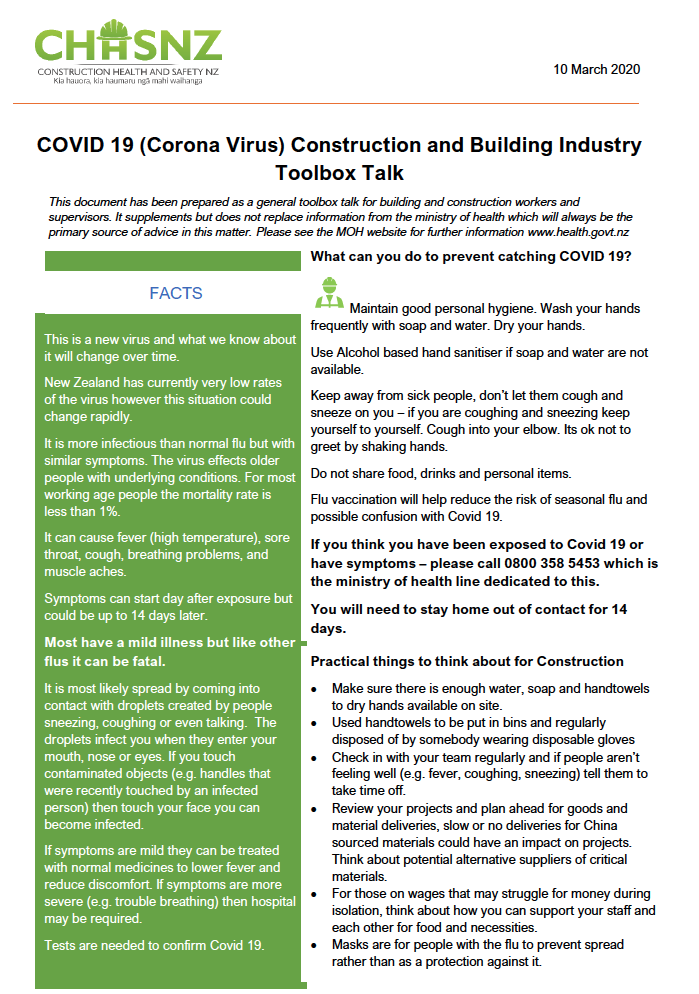Now that the World Health Organisation has declared COVID-19 as a pandemic, the most important thing we can do as individuals and companies – is not panic.
There is a lot of information coming in from news agencies, email and social media – and everyone has a different opinion on how seriously we should (or shouldn’t) take it. The key is to assess the situation with a level head and take mitigative steps so that you’re prepared – rather than caught off guard.
Of course, on the back of all of this are the valid concerns around businesses impacts and the flow on effect it will have to our economy. We are already seeing falls in tourism, borders closed for export, and major events being cancelled in these early stages.
If COVID-19 continues to spread – what will the long-term effects be?
The potential business impacts
Comparatively to other countries, New Zealand has been relatively lucky in terms of reported cases of COVID-19, with eight confirmed (as of 15 March).
One case however did hit close to home for our metals industry – with one of the eight affected, announced as an employee of New Zealand Steel. Every measure was made to safely deal with this at the Glenbrook Steel Mill in accordance with Ministry of Health advice. But it does demonstrate that any company has potential to come in contact with the virus… including ones from our industry. We are not untouchable.
Our CEO Troy Coyle has been keeping a watching brief on the situation as it develops. Touching base with our members to get better understanding of whether they’ve experienced any business impacts. So far, there have been no negative reports, and it appears many are just grappling with the potentialities for right now.
Business and economic specialists BERL have released a report which has stated that “Yes, there will be economic consequences – but that these should be secondary to the primary challenge of securing the health of individuals, families, and communities.”
“Medical personnel, institutions, and authorities must be reassured that financial considerations will not get in the way of the provision of the necessary medical services.”
They go on to state that because of the highly uncertain information about the likely extent, spread and length of the public health crisis, it wouldn’t be helpful to present short-term economic forecasts because they wouldn’t have any sense of probability.
What they do concede is that there are policies that that can and should be used to allay economic concerns of which they go into detail about.
For concerned businesses reading this, this may be well worth the read for you.
What can you do?
At HERA, we’ve implemented a number of changes to business as a result of this pandemic.
As a minimum, we believe it would be prudent for our members to give similar thought to their work practices so that they can meet their health and safety obligations for their team and wider community.
These could include:
- Placing hand sanitiser around your workplace to reduce spread of disease/bacteria and ensuring staff understand the importance of hand-washing and the correct procedures of hand-washing,
- Re-assessing employee travel (particularly internationally) for work purposes,
- Consider changing face to face meetings and events with online ones, or cancelling until more certainty around COVID-19 is ascertained,
- Requesting staff immediately advise their manager if feeling unwell, and if they are exhibiting any cold or flu symptoms – that they go home immediately and self isolate until their symptoms are gone,
- Requesting staff practice self-isolation if they, or a close family member starts to exhibit any symptoms or have been exposed to anyone in a high-risk category in terms of recent travel or exposure,
- Conducting toolbox talks to prevent catching COVID-19. CHASNZ has developed a helpful template for the construction and building industry, and
- Thinking about what work looks like if all your staff have to work remotely. Do they have a laptop? Remote access to server? A workflow that allows for this type of disruption? The confidence from management that it is ok to stay at home for the safety of their team?
It also is a good idea to:
- Ensure that the resources where you are gathering information from are reputable. A good one for New Zealand in terms of health updates is the Ministry of Health COVID-19 notice board. Another useful document to gain facts and insight into the virus itself, is the global health and crisis response report from McKinsey & Company.
- Check out the Worksafe NZ website to see what their recommendations are in terms of minimising the spread of infectious diseases in the workplace and to keep staff safe and well at work.
- Think of attending training to upskill key personnel in how they can navigate a pandemic situation to keep your people, customers and business safe. An upcoming event by EMA, 2-3 April might be of use: One cough, big impact? COVID-19.
Where to from here?
In difficult times, we see both the highs and lows of humanity.
Some have clung onto this event to propel and support their views on certain communities and the closing of borders on them. Others have resorted to fear mongering and preparation for doomsday with toilet paper flying off the shelves! Yet others, have used these events as an opportunity to give and show compassion; finding ways to support affected communities and assessing how they as individuals can reduce the impacts and spread of COVID-19.
It’s important that we try and swing towards the compassionate side of our rationale – rather than let the unknown, fear and misinformation guide our actions.
We need to come together, continue learning and create genuine connections. We all have a role to play.
Update shared by our Manager Marketing and Communications, Kim Nugent



